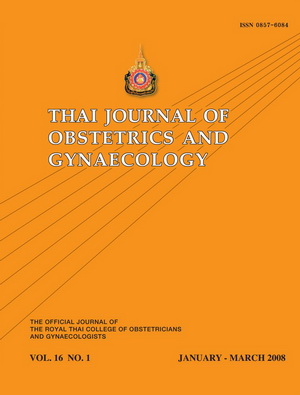The accuracy of using random urinary protein-to-creatinine ratio for prediction of significant proteinuria for diagnosis of preeclampsia in hypertensive pregnancies
Main Article Content
Abstract
Objective To evaluate the accuracy of random urinary protein-to-creatinine ratio for prediction of significant proteinuria for diagnosis of preeclampsia in hypertensive pregnancies.
Material and method Regardless of the urinary protein dipstick determinations, women who had hypertension after 20 weeks of gestation, admitted in obstetric ward, Chonburi Hospital, were studied prospectively. Random mid-stream urine specimen were obtained for protein-to-creatinine ratio determination before initiation of a 24-hour urine collection. With the criterion of 24-hour proteinuria of at least 300 mg as a significant proteinuria, the sensitivity, specificity and accuracy of a random urinary protein-to-creatinine ratio of > 0.25 for prediction of significant proteinuria were analyzed and a receiver operating characteristic curve was constructed to determine the optimal cutoff value for prediction of significant proteinuria for diagnosis of preeclampsia in hypertensive pregnancies.
Results Sixty-seven patients completed the study. Forty-five percent of the study population had significant proteinuria. The optimal cutoff value is 0.25 which yielded sensitivity, specificity and accuracy of 90.0%, 75.9% and 85.1% respectively. Three patients who had false-negative test results were mild preeclampsia. Seven false-positive test results had 24-hour urine protein levels that ranged from 134 to 288.2 mg.
Conclusion In hospitalized patient, the random urinary protein-to-creatinine at a cutoff of > 0.25 revealed a high accurate prediction of significant proteinuria for diagnosis of preeclampsia in hypertensive pregnant women. This test could be useful in the screening, assessment, and follow-up of proteinuria in hypertensive pregnancy and avoidance of the problems of associated with 24-hour urine collection.


